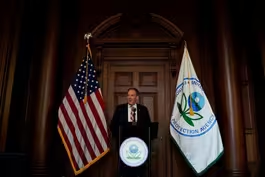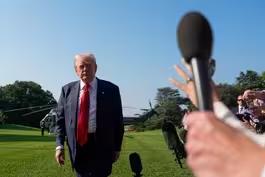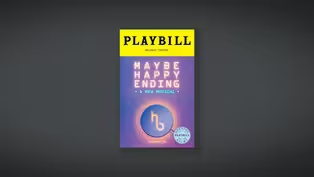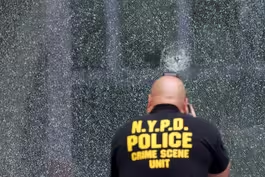
Two senators on working across the aisle to combat wildfires
Clip: 7/29/2025 | 11m 14sVideo has Closed Captions
Senators highlight importance of working across the aisle in mission to fight wildfires
With razor-thin GOP majorities in the House and Senate, many lawmakers are retreating to their political corners rather than seeking out compromise. But one bipartisan duo is bucking the trend, arguing their disaster prevention proposal can overcome political dysfunction. Amna Nawaz discussed that with Republican Sen. John Curtis of Utah and Democratic Sen. Alex Padilla of California.
Problems playing video? | Closed Captioning Feedback
Problems playing video? | Closed Captioning Feedback
Major corporate funding for the PBS News Hour is provided by BDO, BNSF, Consumer Cellular, American Cruise Lines, and Raymond James. Funding for the PBS NewsHour Weekend is provided by...

Two senators on working across the aisle to combat wildfires
Clip: 7/29/2025 | 11m 14sVideo has Closed Captions
With razor-thin GOP majorities in the House and Senate, many lawmakers are retreating to their political corners rather than seeking out compromise. But one bipartisan duo is bucking the trend, arguing their disaster prevention proposal can overcome political dysfunction. Amna Nawaz discussed that with Republican Sen. John Curtis of Utah and Democratic Sen. Alex Padilla of California.
Problems playing video? | Closed Captioning Feedback
How to Watch PBS News Hour
PBS News Hour is available to stream on pbs.org and the free PBS App, available on iPhone, Apple TV, Android TV, Android smartphones, Amazon Fire TV, Amazon Fire Tablet, Roku, Samsung Smart TV, and Vizio.
Providing Support for PBS.org
Learn Moreabout PBS online sponsorshipAMNA NAWAZ: With razor-thin GOP majorities in the House and Senate, many federal lawmakers are retreating to their political corners, rather than seeking out compromise in the middle.
But one bipartisan duo is bucking the trend, arguing their disaster prevention proposal can overcome Congress' political dysfunction and is necessary amid worsening wildfire seasons nationwide.
I recently sat down with Republican Senator John Curtis of Utah and Democratic Senator Alex Padilla of California on Capitol Hill to discuss their bill and working across the aisle.
Senator Curtis, Senator Padilla, welcome to the "News Hour."
Thank you for joining us.
SEN. ALEX PADILLA (D-CA): Thanks for having us.
SEN. JOHN CURTIS (R-UT): Absolutely.
Good to be here.
AMNA NAWAZ: So I want to begin with this effort that you are both working on together.
It's worth reminding people it's been months since those wildfires that we covered that ravaged L.A. County in California.
We know communities are still struggling to come back.
We have seen currently in Utah as well there's a number of active fires burning right now.
So this is something that clearly impacts both of your states and so many others.
How did this bill, as a bipartisan effort, how did it come together?
Who went to whom?
SEN. JOHN CURTIS: This is one of those things it's impossible to say it started here or it started there.
It's been bubbling for a long time.
And some of these ideas have been bubbling for a long time, and it was great to have them crystallize and come together.
SEN. ALEX PADILLA: Right.
It's -- the dynamic and the challenge of wildfires is not new, not to Utah, not to California, but it has been progressively building bigger and bigger over the course of the last decade, right, more frequent fires, more devastating and larger wildfires.
And given, I think, the scale of the damage in Southern California back in January, it just underscored the urgency with which we need to better prepare to mitigate and prevent fires when we can, or at least keep them from getting as big as they do.
So it did provide the impetus for putting a lot of the proposals, bills that had been discussed in previous sessions together and sort of take it and add it to the momentum that we had.
AMNA NAWAZ: So I want to tell people a little bit about what the bill proposes here, because it does aim to essentially overhaul how we manage forests in the U.S.
It also aims to set up a federal wildfire intelligence center that would streamline information.
Senator Curtis, how would that work?
What does that change?
SEN. JOHN CURTIS: The beauty of the bill is, it is not just focused on one thing.
It's focused on everything, from starting early to prevent them, to deal with them while they're happening, and also deal with them afterwards.
And, as you mentioned, one of the problems we have had is interagency coordination and cooperation.
And this bill addresses that and tries to bring all that together, get us out of our silos, so that we're actually working together and pulling in the same direction.
SEN. ALEX PADILLA: Maybe on the federal government side, there's a way to be more effective, more efficient by pulling in that expertise, those resources and even personnel from different departments and agencies under one roof, and establishing a wildfire intelligence center to take advantage of the research, the experience and the data that's been collected through these experience.
Very similar to what the Weather Service does under NOAA, right, capture it all and make it very usable for people who depend on that data to get ready for fire season, respond to fires when they happen, and help us in that rebuilding stage as well post a disaster to try to prevent and mitigate future incidents.
SEN. JOHN CURTIS: It wouldn't be unusual in Utah to have a fire that started on Forest Service land, moved over to BLM land, moved over to state land, came down into a city or county and encroached.
And now you have all of these agencies competing with each other in how they're going to deal with this.
And that -- if we can bring that together and bring that intelligence together, we will fight these a whole lot more effectively.
AMNA NAWAZ: So is there federal funding for this at a time when we have seen -- it feels like the momentum around federal response and disaster response in particular is to pull back, to have states carry more of that responsibility.
SEN. JOHN CURTIS: Well, first of all, let me bring up how expensive it is once these fires start, right?
If we're successful in what we're doing, we will save the taxpayers massive amounts of money.
The second thing I'd point out is, we have asked for all the appropriations needed to do what's needed in this bill and still stayed within the limits that we're trying to target financially.
AMNA NAWAZ: How do you keep the politics out of it?
And I say this because we have seen with President Trump sometimes an effort to withhold federal disaster funds when there's a Democratic state involved.
How do you keep politics out of this effort?
SEN. ALEX PADILLA: Wildfires don't distinguish between Democratic states and Republican states.
It impacts everybody.
And so that's our incentive to sort of check the partisan politics at the door and do the substantive work on behalf of our constituents.
SEN. JOHN CURTIS: We have tried to build a bill that will last through many administrations, whether they're Republican or Democrat, and accomplish the goals and objections of this regardless of the administration.
AMNA NAWAZ: So you're confident you will have the votes in the Senate to get it to pass?
SEN. JOHN CURTIS: This is the United States Senate.
You're never confident of anything.
SEN. ALEX PADILLA: Right.
Disaster preparedness, disaster response will be -- will maintain a bipartisan priority.
AMNA NAWAZ: In terms of the bipartisan effort that's gone into this bill I don't want to assume anything here, but you may not even agree on what's fueling these more extreme fires, these longer wildfire seasons that we're seeing.
Certainly, folks on both sides of the aisle may debate over the reasons behind that.
So, how do you that aside?
SEN. JOHN CURTIS: We understand that the environment is drying, it's warmer.
That's not contested, right?
I don't really think we had any discussions about the cause of this.
I think we can all... AMNA NAWAZ: Climate change never came up?
SEN. JOHN CURTIS: It never came up.
Like, we all know that it is dryer and less rain and less moisture than we have had before.
We all know that the seasons are longer and hotter.
That is not a debatable thing.
And -- but we do know that these fires are devastating our communities.
They're very expensive.
And the loss of life and property is something that can't be tolerated.
SEN. ALEX PADILLA: That's why I like working with John, because we can maybe disagree on what words to use, but let's at least be grounded on truth and science and data.
SEN. JOHN CURTIS: There's a number of factors fueling this that are really not partisan issues.
AMNA NAWAZ: There is another bipartisan effort in the House that I have to ask you both about because it's been dominating headlines.
And that's the effort to release files related to Jeffrey Epstein.
We have seen a number of Republicans in the House join a Democratic effort to release those files.
Senator Padilla, you have seen a number of opinions on the Democratic side.
I did hear your Democratic colleague Senator Elissa Slotkin say, this isn't where her focus is, because this is not where her constituents' focus is.
What do you make of House Democrats' particular focus on this issue right now?
SEN. ALEX PADILLA: Because it's the latest example, in my opinion, of the Trump administration, or at least Donald Trump, saying one thing on the campaign trail and then acting differently once he's in office, or even earlier on in the administration, where Attorney General Bondi was holding up binders saying that the list was on her desk.
And they turn around and say, well, there is no list of names.
So which is it?
You can't have it both ways.
Were you telling the truth?
Now you're lying, or were you lying first and now telling the truth?
So I come at it from a perspective of transparency and accountability.
That's our job as members of the Senate, members of Congress, to hold this administration and any administration accountable.
AMNA NAWAZ: So you think that they're right to lean into that message right now?
SEN. ALEX PADILLA: I think for two reasons, one, the issue of Epstein and the heinous crimes related to that, but also as yet another example of this administration doing anything but being transparent and accountable.
AMNA NAWAZ: Senator Curtis, both Speaker Johnson and Senator Graham have recently said they support the files being released in some form as long as victims are protected and the information is credible.
Do you agree with that approach?
SEN. JOHN CURTIS: This isn't only a Trump administration issue.
All of these files existed with the previous administration, and they also chose not to release them.
And I think this really points out how desperate the American people are for transparency, how much we're doubting institutions, and that this is a real opportunity for us to step up and say, nothing to hide.
I'm going to make you a bet right now that our two names aren't on that list.
And let's give the American people some transparency.
Let's also not make this a major distraction.
We have important things to do.
If this gets in the way of our bill, that's going to be a problem, right?
So I think we can do both, right?
Let's be transparent, but let's also not stop the work of the Senate.
AMNA NAWAZ: For the people who are watching this interview who may themselves disagree with their neighbors, their friends, their family on many of these issues, how do you come together?
How do you find space to work on the things that you do agree on?
Give us some tactical, tangible tips.
Senator Curtis?
SEN. JOHN CURTIS: Yes, I think one of my aha moments was coming to Washington, D.C., and realizing that people can be very genuine and have different perspectives than I have.
So let's begin with realizing that they're genuine and they see things differently than I do.
And just because they're different, it doesn't mean that they're not genuine.
SEN. ALEX PADILLA: It's one thing to say, well, we're negotiating a budget and we're adjusting some numbers around the edges here and there, or even tax policy, right?
What do we really care about versus looking at the fiscal health of our country?
And then there's those much more controversial, in some eyes, issues, sensitive issues in some people's eyes.
And I think immigration is on the top of the list when it comes to people who feel very passionately, maybe over here or maybe over there.
But, like you said, if we can disagree on 99 things, but find one area of agreement, as much as I may disagree with you on those other 99, I owe it to my constituents to work hard with whoever I need to work with to try to make progress maintaining my values, maybe compromising a little bit around the edges, but maintaining my values as a result.
I think it's -- you owe it to your constituents to do the same.
I owe it to mine and wherever we can see that overlap, then we lean in.
SEN. JOHN CURTIS: I think compromise gets a bad rap.
And I think it's because oftentimes people look at compromise like you give up half of what you want, I will give up half of what I want.
We will both plug our nose and support this.
That's bad compromise.
But if we can sit down and find those areas of intersection where we actually agree, that's a different kind of compromise.
And my experience is, the best work -- and Fix Our Forests is a really good example of that, of where I don't think either one of us feel like we have abandoned our principles, but we actually found some areas of overlap that are really important to this country and to our constituents.
AMNA NAWAZ: Gentlemen, it has been such a pleasure to speak with you both.
I thank you so much for your time and your candor.
Senator John Curtis, Senator Alex Padilla, thank you.
We appreciate it.
SEN. ALEX PADILLA: Thank you.
AMNA NAWAZ: And, online, you can hear more from the senators on immigration, including reflections on the moment that Senator Padilla was handcuffed by federal agents last month.
You can find that part of the conversation on our YouTube channel.
EPA to overturn finding used to regulate carbon emissions
Video has Closed Captions
Clip: 7/29/2025 | 7m 49s | EPA plans to overturn scientific finding used to regulate carbon emissions (7m 49s)
FCC commissioner says Trump's actions threaten press freedom
Video has Closed Captions
Clip: 7/29/2025 | 8m 17s | Trump's 'censorship and control' campaign threatens press freedom, FCC commissioner says (8m 17s)
Gaza seeing 'worst case' famine scenario, aid group warns
Video has Closed Captions
Clip: 7/29/2025 | 4m 52s | Gaza experiencing 'worst case' scenario of famine, leading aid group warns (4m 52s)
'Maybe Happy Ending' musical captivates Broadway audiences
Video has Closed Captions
Clip: 7/29/2025 | 7m 3s | 'Maybe Happy Ending' actor and composer on the musical that's captivating Broadway (7m 3s)
News Wrap: Gunman was targeting NFL, New York mayor says
Video has Closed Captions
Clip: 7/29/2025 | 5m 28s | News Wrap: Gunman was targeting NFL, New York mayor says (5m 28s)
Why 'manosphere' content is appealing to some young men
Video has Closed Captions
Clip: 7/29/2025 | 7m 53s | Why 'manosphere' content is appealing to some young men (7m 53s)
Providing Support for PBS.org
Learn Moreabout PBS online sponsorshipSupport for PBS provided by:
Major corporate funding for the PBS News Hour is provided by BDO, BNSF, Consumer Cellular, American Cruise Lines, and Raymond James. Funding for the PBS NewsHour Weekend is provided by...

















